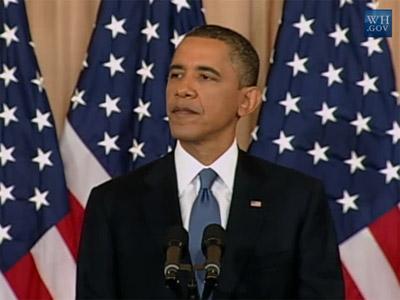President Obama Calls for Middle East Reform
President Obama delivers Mideast speech
The Arab Spring has put pressure on President Obama to articulate a coherent policy response. But he has been addressing each country on a case-by-case basis. Obama has been weighing the benefits of reform against the strategic costs of alienating key rulers.
Obama made it clear he was with the protestors in Tunisia and Egypt . In Libya he went to war on their behalf. But not in Syria, and the picture has been more complicated in Bahrain and Yemen. In this speech Thursday, Obama laid out some core principles that guide US policy.
“The US opposes the use of violence and repression against the people of the region,” Obama said. “The United States supports a set of universal rights and these rights include free speech, the freedom of peaceful assembly, the freedom of religion, equality for men and women under the rule of law. And the right to choose your own leaders, whether you live in Baghdad, or Damascus; Sanaa or Tehran.”
Obama announced an economic aid initiative for the region starting with Egypt and Tunisia. He singled out those countries because Egypt is a longstanding ally and Tunisia was in the vanguard of the democratic wave. By contrast, Obama condemned Syria for choosing what he called the path of murder and mass arrest.
“The Syrian government must stop shooting demonstrators and allow peaceful protests,” said Obama. “It must release political prisoners and stop unjust arrests it must allow human rights monitors to have access to cities like Daraa. And start a serious dialogue to advance a democratic transition.”
Obama said Syrian President Bashar al Assad, has a choice: Lead the transition or get out of the way. He compared Syria’s crackdown on protestors to that of Iran on the protestors of the Green Revolution two years ago.
But Obama also acknowledged that it’s not just America’s foes who are cracking down — it’s also friends like Yemen and Bahrain. And he said that friend and foe a like need to understand that they must take the risks that reform entails to have the full support of the United States.
Finally Obama called on the Israelis and Palestinians to continue to try to forge a peace which he argues is now more urgent than ever. And he encouraged Americans to see their own history in the upheaval in the Middle East and North Africa.
“Our nation was founded through a rebellion against an empire,” said Obama. “Our people fought a painful civil war that extended freedom and dignity those who were enslaved. And I would not be standing here today unless past generations turned to the moral force of non-violence as a way to perfect our union.”
Obama’s speech had many audiences Thursday and he tried to reach them all without causing too much offense. But his broad appeal for peaceful reform doesn’t change the tough strategic questions that litter the road ahead.
The World is an independent newsroom. We’re not funded by billionaires; instead, we rely on readers and listeners like you. As a listener, you’re a crucial part of our team and our global community. Your support is vital to running our nonprofit newsroom, and we can’t do this work without you. Will you support The World with a gift today? Donations made between now and Dec. 31 will be matched 1:1. Thanks for investing in our work!
